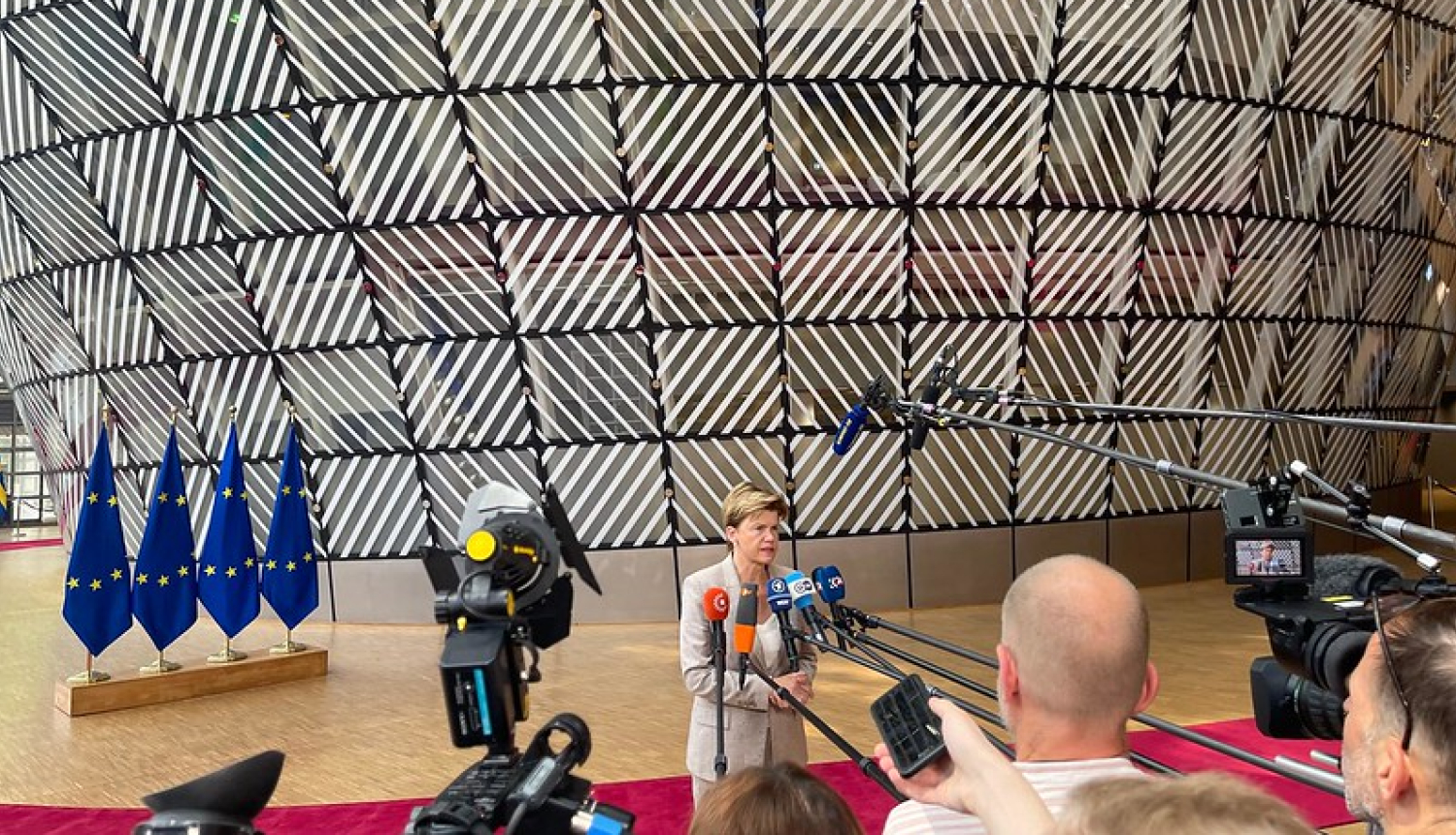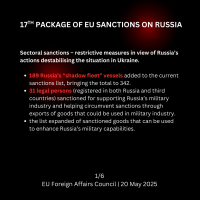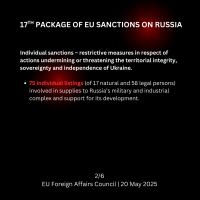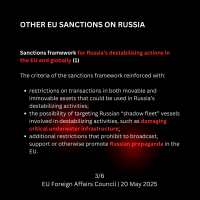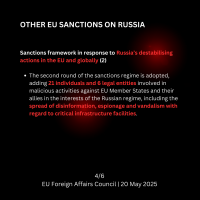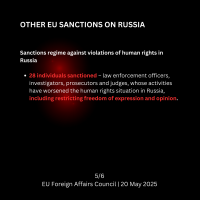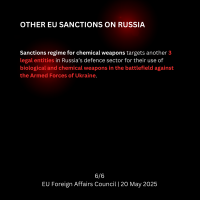On Tuesday, 20 May 2025, the EU Foreign Affairs Council officially agreed the 17th package of sanctions on Russia thereby considerably increasing economic pressure on the aggressor state, including through the following: 1) 189 Russia’s “shadow fleet” vessels were added to the EU sanctions list, bringing the total to 342; 2) sanctions imposed on another 31 persons (legal and natural) for their support to Russia’s military industry and help to circumvent sanctions by exporting goods for military industry; 3) the list of sanctioned goods supplemented to include chemical precursors, spare parts for equipment and other goods which may be used for the development of Russia’s military capabilities; 4) new sanctions imposed on 75 persons (17 individuals and 58 legal entities) involved in supplying the Russian military industry and supporting its development.
An exchange of views on further support to Ukraine was joined by the Minister of Foreign Affairs of Ukraine, Andrii Sybiha, in person. He thanked EU ministers for their support and briefed them about talks with Russia and the United States, as well as the situation in Ukraine. Baiba Braže reaffirmed continued support for Ukraine, and the need to undermine Russia’s ability to wage war. The Minister welcomed the sanctions adopted and called on ministers to agree the next package soon.
On Foreign Minister Braže’s proposal, the International Special Envoy for the Implementation of EU Sanctions, David O’Sullivan, took part in the Foreign Affairs Council and informed the ministers about latest developments in the fight against the circumvention of sanctions.
Foreign Minister Baiba Braže: “We continue to impose targeted sanctions on those sectors that still bring revenue to Russia’s budget to carry on with its war of aggression. Russia’s daily attacks on Ukraine persist. This does not demonstrate any willingness to end the war and reach a peace agreement. Russia needs to be pressured to peace, and we will continue to do so. Special Envoy O’Sullivan has confirmed the effectiveness of sanctions and the fact that Russia is actively seeking to circumvent all sanctions imposed – those by the EU, the UK, the U.S., and others. We are already working on the 18th package of EU restrictive measures to strengthen the sanctions regime and prevent circumvention.”
Alongside the 17th package of EU sanctions, additional restrictive measures have been approved under the regime in response to Russia’s destabilising (unconventional) activities. Among other measures, it will be possible to target Russia’s “shadow fleet” vessels involved in destabilizing activities, such as damaging critical underwater infrastructure. Additional restrictions have been set prohibiting to broadcast, support or otherwise promote Russian propaganda in the EU; 27 persons have been designated (21 individuals and 6 legal entities) involved in malicious activities against EU Member States and their allies in the interests of the Russian regime, including the spread of disinformation, espionage and vandalism with regard to critical infrastructure facilities.
The EU sanctions framework for the human rights situation in Russia has been extend, and a new, second package added, sanctioning 28 individuals – law enforcement officers, investigators, prosecutors and judges, whose activities have worsened the human rights situation in Russia, including restrictions on freedom of expression and opinion. Under the sanctions regime for chemical weapons, another three legal entities have been targeted in Russia’s defence sector for their use of biological and chemical weapons in the battlefield against the Armed Forces of Ukraine.
In a discussion on developments in the Middle East, ministers considered possibilities for EU action in the Gaza Strip, including coordinated action in relation to the UN conference on a two-state solution to be held in New York in June. Ministers also discussed the annual review of EU restrictive measures imposed on Syria, and approved a statement by the EU Foreign Affairs Council on lifting economic sanctions on Syria. The aim is the improvement of the socio-economic situation and stability in the country to prevent spill-over of security risks beyond the Syrian borders.
Following the Foreign Affairs Council, EU foreign ministers will take part in the EU-African Union (AU) ministerial meeting co-chaired by the High Representative of the European Union for Foreign Affairs and Security Policy, Kaja Kallas, and the Minister of External Relations of Angola, Chairperson of the AU Executive Council, Tete António. This will be an opportunity to inform partners from African countries about Latvia’s priorities for the UN Security Council ahead of elections scheduled for 3 June, to explain Latvia’s position concerning Russia’s war of aggression against Ukraine and discuss economic cooperation.




